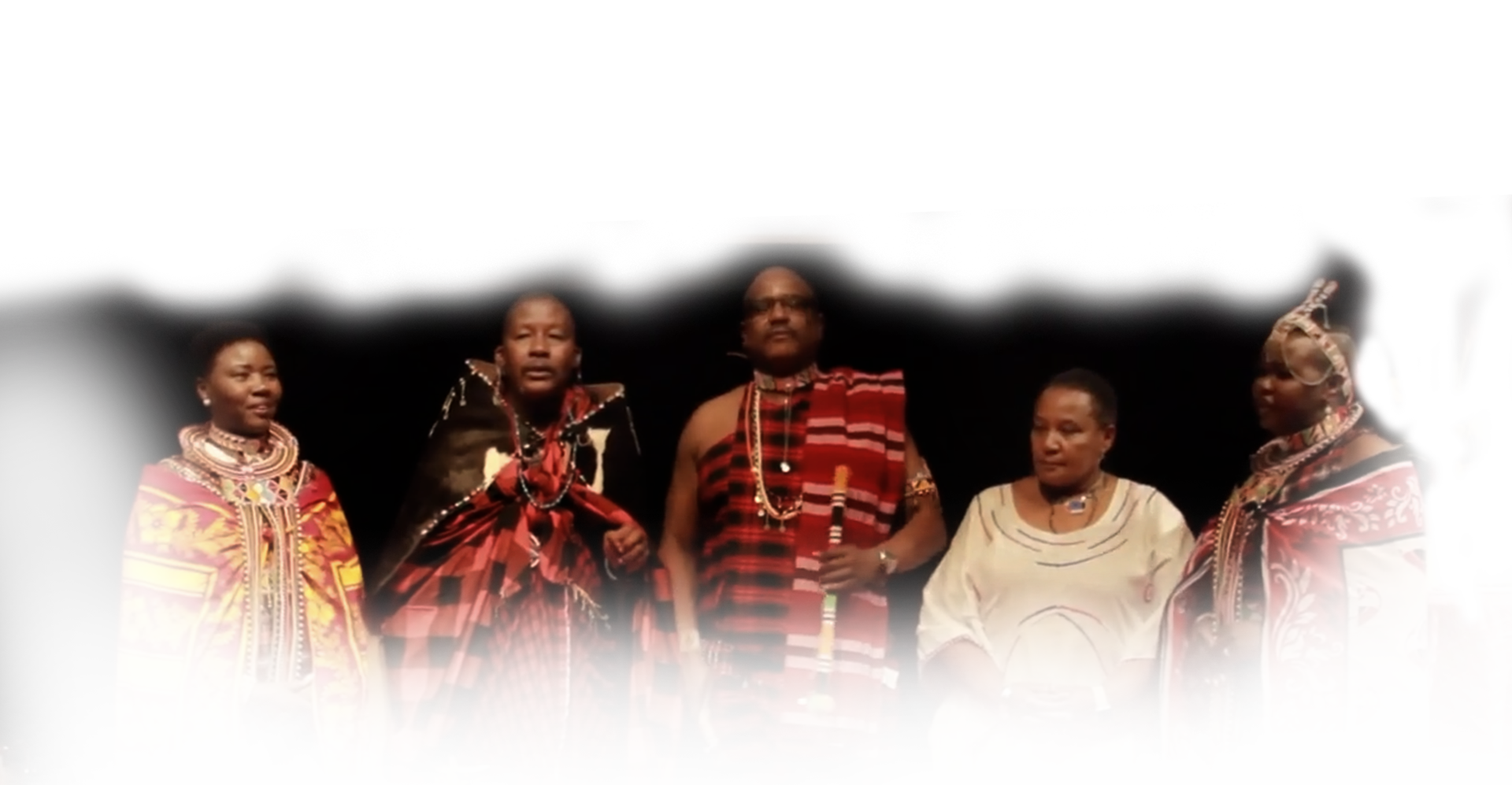
WISDOM TREASURE AWARD
The Wisdom Treasure Award is presented annually to honor the work of an Elder who has demonstrated a lifelong commitment to bringing wisdom, leadership, service, and learning to their people and their community. Elders are the keepers—of tradition, of a profound relationship with the living world, and of the Sacred. They protect, guide, and teach their communities. By honoring them, not only do we bring awareness to the importance and relevance of their wisdom and perspective, but we can acknowledge that their qualities—the respectful relationship they maintain with everything around them, the way in which they demonstrate gratitude—are those from which we can learn.
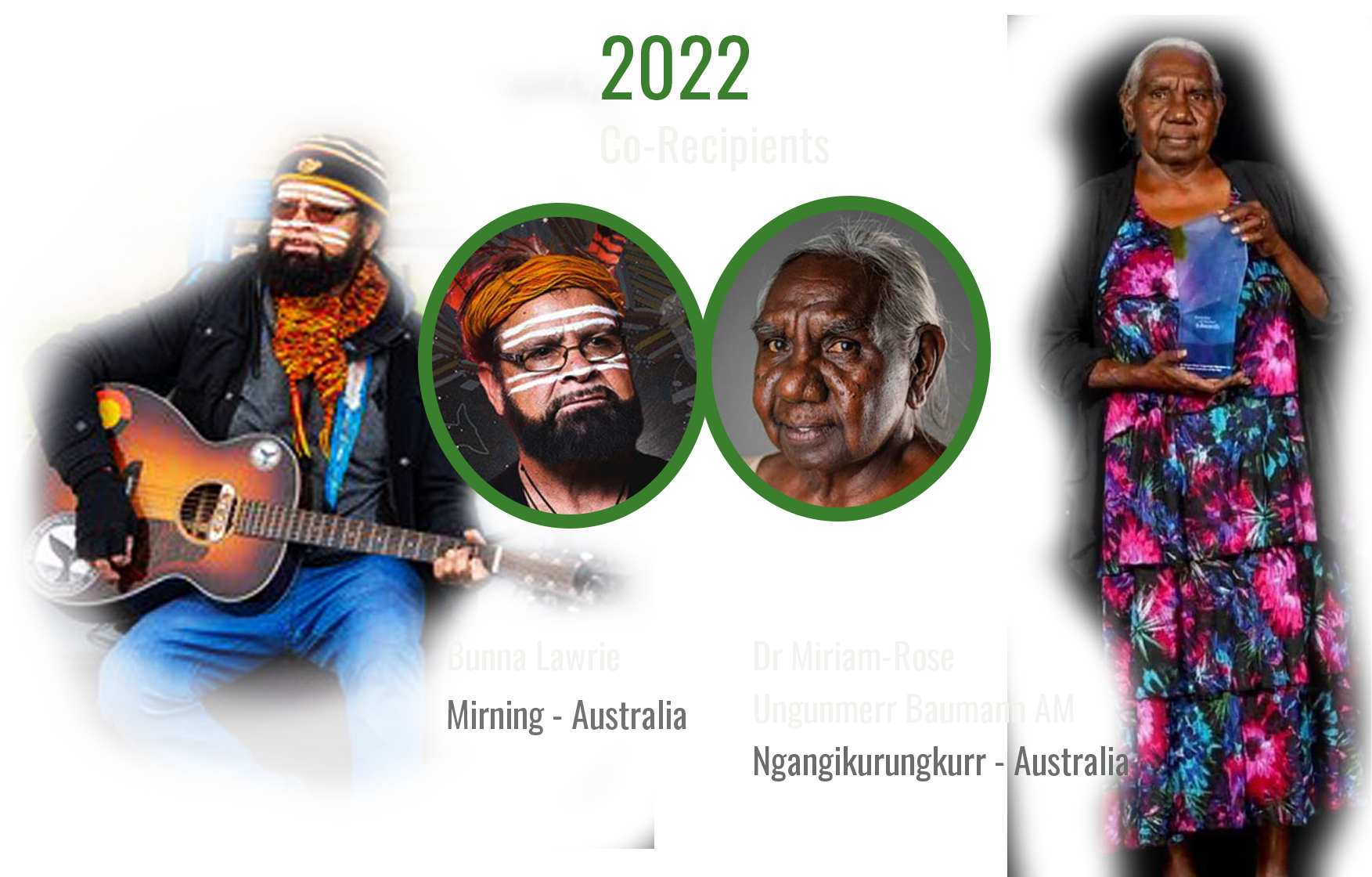
“This award is deeply touching to receive. May this inspire the younger generations to learn about their responsibilities and duties in caring for Country. This is an opportunity to reach others so that they can learn about how we live and continue our connection with land and sea. This is a global responsibility for indigenous peoples. We ask non-indigenous peoples to listen, learn, understand and observe and from this you will receive wisdom and knowledge, for this is our Mirning way that you can also follow.
Receiving this jointly with Miriam makes me feel double proud and really amazing. She is a great Elder and Female Aboriginal voice for this country, which holds the World’s oldest continuous culture. I wish to acknowledge the many diverse First Nations peoples of Australia and throughout our planet for their work in custodianship.”
– Bunna Lawrie, Elder, Whale Songman and Activist
Bunna is a Senior Elder of the Mirning People of the coastal country of the Billiaum Mocalba, the Great Australian Bight. He carries one of the World’s oldest lineages, which has continued since the Dhoogoor, Dreamtime and through over 3,000 generations. Bunna has dedicated his life to community, culture and country; taking great strength from the spiritual tradition of his ancestors. Beyond the Mirning, he has been recognised and honoured as one of Australia’s leading indigenous musicians, as an advocate for culture and for his work protecting the environment.
Born in 1950, he was raised in South Australia on the mission by a close family who secretly passed on the oral stories, traditions and language of his ancestors. His musical gifts lead to him establishing the multi-award-winning group Coloured Stone and then, in his 40s, he was recognised by his Elders as the Whale Songman of the Mirning People. For thirty years Bunna has been his People’s spokesman and has fought to have traditional ‘native title’ acknowledged.
He has travelled nearly every backroad of Australia sharing and healing through music, knowledge and wisdom. He has also supported in ritual and ceremony the continuity of many whale totem peoples. Bunna’s Mirning family are the Whale Dreamers of the World’s greatest whale nursery and sanctuary, which he tirelessly works to protect.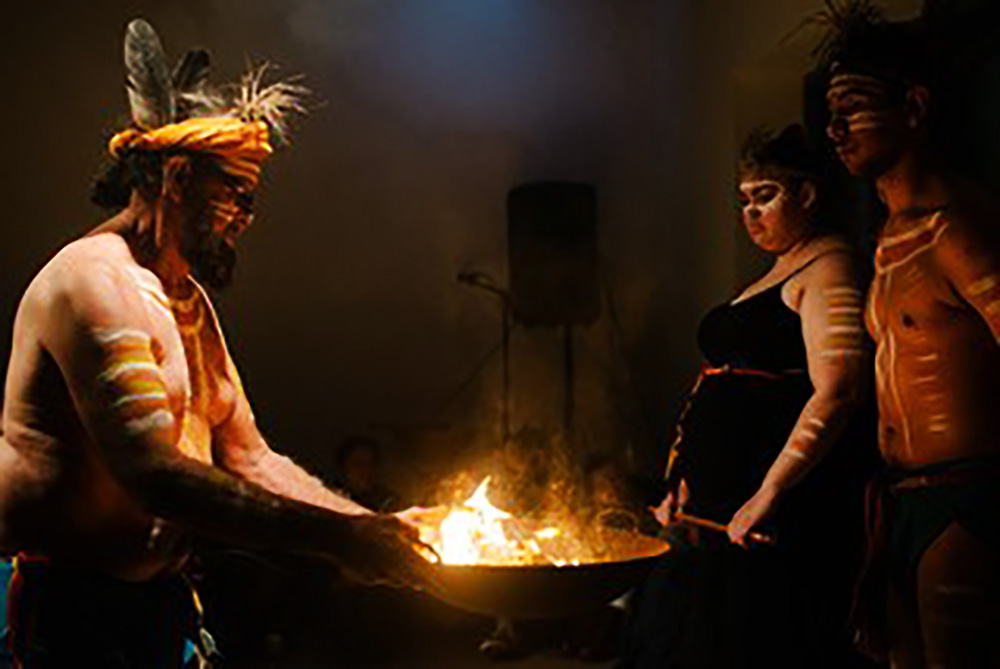
Bunna is dedicated to passing down knowledge and teaching younger generations the traditional language, knowledge, wisdom and culture to preserve and protect sea and country. In respect of the totems, he works to keep the connection and relationship alive. By preserving and sharing his wisdom with Mirning children and others, he teaches for future generations to come. They can then learn and carry the ancient laws, customs, traditions and protocols that have kept country so pristine.
Bunna has been a mentor, Elder and inspiration for many in Australia and internationally. He has devoted his life to following the ways of his ancestors and teaching from the word Mirning, which means “listen, learn, understand and observe and then you will have wisdom and knowledge.”
Dr Miriam-Rose Ungunmerr Baumann AM, 2021 Senior Australian of the year, is a renowned Aboriginal Artist and Educator who is dedicated to creating bright and fulfilling futures for Aboriginal children and youth. She was the first fully qualified Aboriginal teacher in the Northern Territory and is the founder of the Miriam Rose Foundation. Miriam-Rose speaks five local languages along with English and is responsible for establishing the highly successful Merrepen Arts centre in Nauiyu.
Born in the bush near Daly River, Miriam-Rose is a member of the Ngangiwumirr language group. When Miriam Rose was around five years old, she was placed in the care of her Aunt Nellie and Uncle Attawoomba Joe, a legendary police tracker.
Miriam-Rose undertook a Teacher Assistants course at Kormilda College in Darwin and became a teacher’s aide at the St Francis Xavier mission school at Daly River. In 1971, passionate about teaching and education, she returned to Kormilda to undertake teacher training. It was during this time that Miriam Rose became keenly interested in painting.
In 1975, Miriam-Rose returned to Daly River as the Territory’s first fully qualified Aboriginal teacher and for many years held the position of Art Consultant with the Professional Services Branch of the Northern Territory Department of Education. During this time, she visited schools throughout the Territory and promoted the inclusion of visual art as a part of every child’s education.
Miriam-Rose also saw the need for more Aboriginal teachers to work among non-Aboriginal school children. She became deeply committed to ensuring that Aboriginal people had the opportunity to become qualified teachers and to manage their own schools. She encouraged other women from Daly River to study to become teachers and initiated a very successful remote area, teaching education program. It was during this time that St Francis Xavier school was completely staffed and managed by Aboriginal people.
Miriam-Rose continues to advocate that education is a matter for the whole community, and must be adapted to suit contemporary Aboriginal needs.
In 1986, along with other members of the Nauiyu Community, Miriam-Rose established the Merrepen Arts Centre which fosters adult education with a strong focus on the visual arts. The highly successful and now nationally recognised arts centre belongs to the Nauiyu community and has over 100 member artists who work with paints, etchings and textiles.
In 1988 Miriam-Rose was awarded a Bachelor of Arts Degree by Deakin University and two years later, she began training as a school principal. By 1993 Miriam had gained a Bachelor of Education degree and was appointed to the position of Principal at the St. Francis Xavier School at Daly River. She later went on to gain her Masters of Education Degree, with a high distinction. The focus of work for her Master’s degree was the integration of traditional and western education for Aboriginal children and adults.
In 1998, Miriam-Rose was appointed a Member of the Order of Australia, for her services to Aboriginal education and art, and her services to the Nauiyu community.
Miriam’s Order of Australia was later followed by further acknowledgment when she was awarded an honorary doctorate from the Northern Territory University. This was in recognition of her outstanding service and contribution to the Northern Territory in the fields of arts and education.
On January 25, 2021 Miriam was named the Senior Australian of the Year.
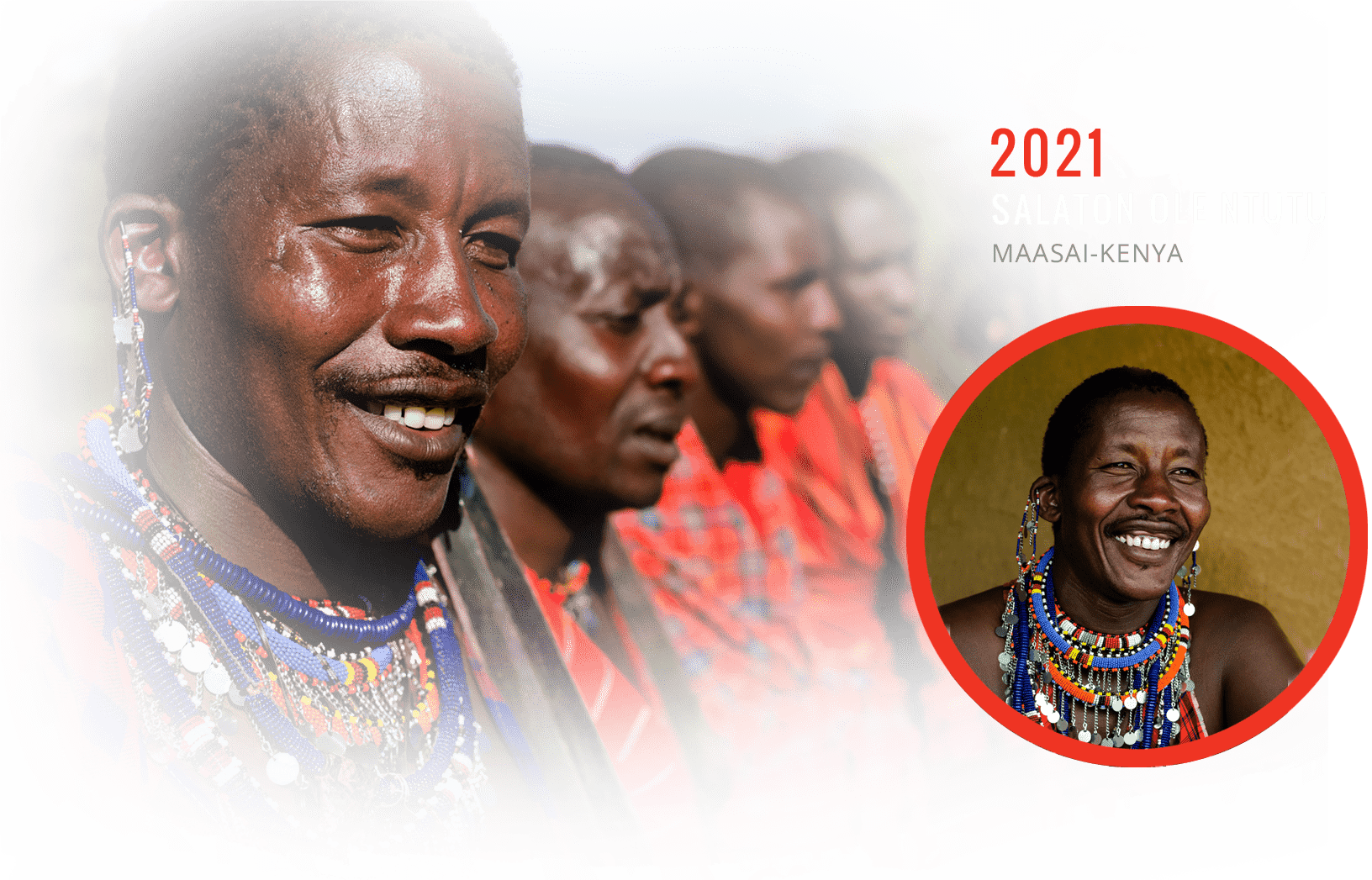
Salaton Ole Ntutu is the Cultural Chief and Elder of his African community Maji Moto. He was chosen as a young child to receive the spiritual knowledge of his Ancestors. Dedicated to keeping his culture alive and thriving, Salaton is a key partner and advisor for international non-profit organizations that support the Narok region.
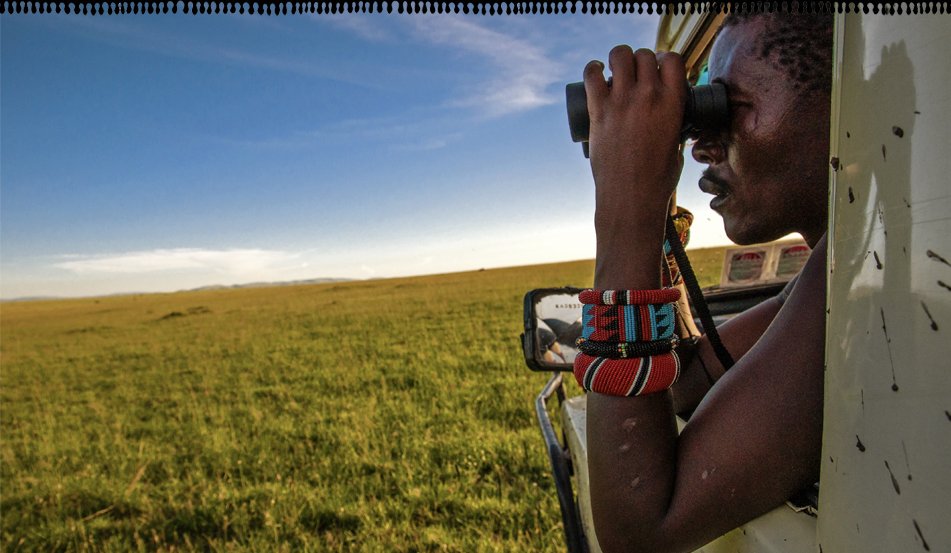
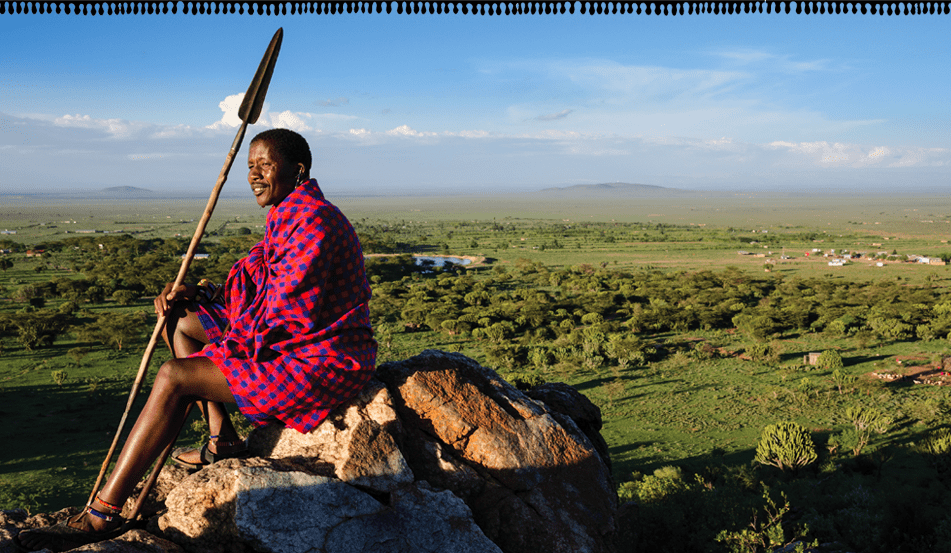
He champions self-sustaining initiatives in the areas of employment, water, women’s rights, education, conservation, and tourism through organizations he has helped to found.
Medungi Conservation is a community-based organization that protects cultural values, ceremonies, and traditions through projects that include health services, protection of land for holy and medicinal plants and trees, cultural ceremonies, and wildlife, and food security projects such as farming and beekeeping.
Through Maji Moto Maasai Cultural Camp, conceived of in 2004, Salaton can fund these progressive projects and share the value of his Tribe’s traditions.
A lifelong dream for Salaton is to demonstrate to the Maji Moto community and to the Kenyan government that people can thrive by simultaneously preserving traditions and respecting the natural world, and while doing so can increase awareness of the criticality of Indigenous wisdom for all humankind.
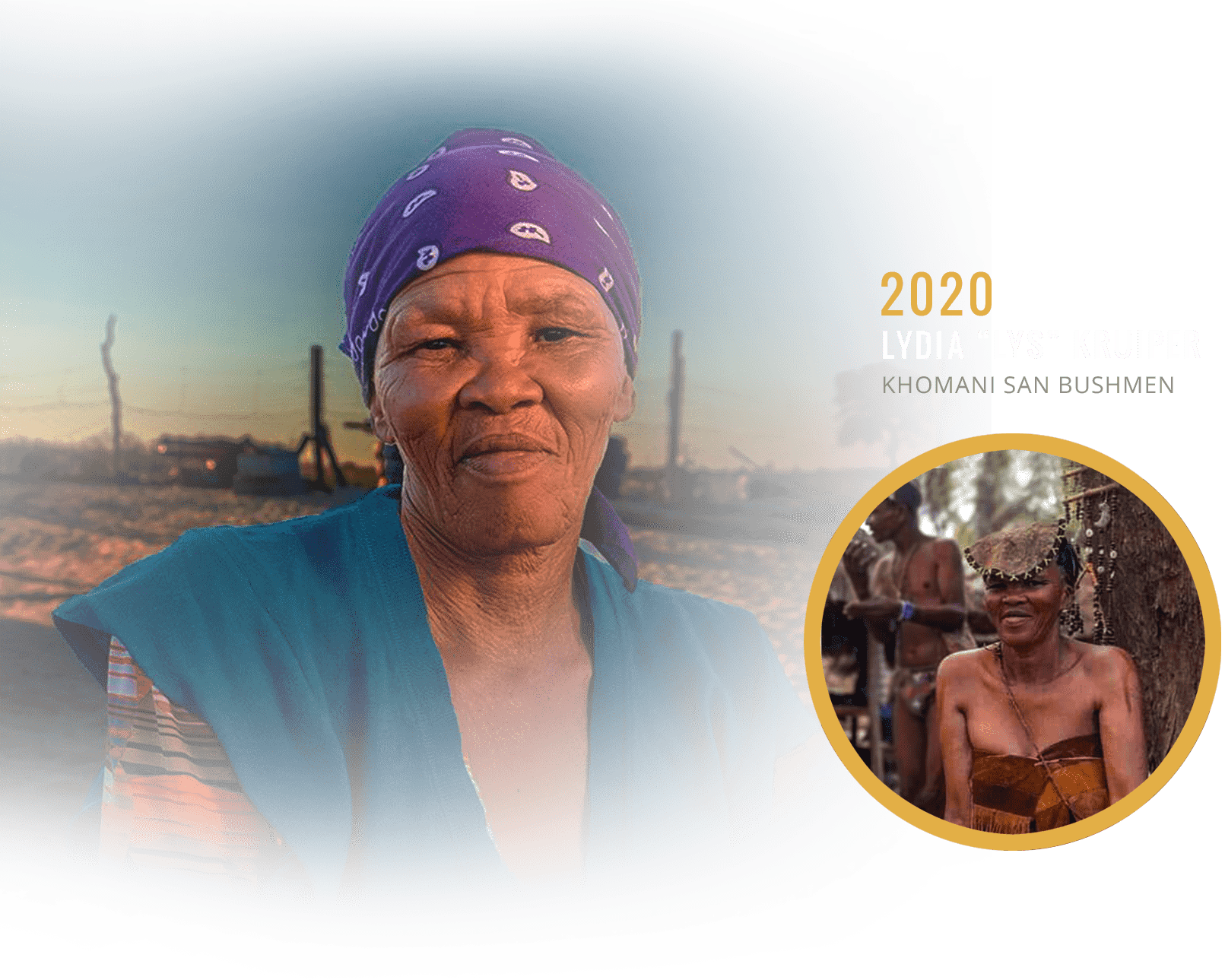
Lydia “Lys” Kruiper is a well-respected leader, Healer, and Elder of the Khomani San community. She is the daughter of the late San Traditional leader, Dawid Kruiper. Her soft-spoken demeanor and small stature run contradictory to the power she manifests. Like the blanket of stars that fill the sky at night over the dunes of the Kalahari Desert, Lys shines brightly everywhere she goes.
She is a caretaker for many children in the community who are living in high-risk situations such as domestic abuse. Like most Bushmen families, Lys and her husband Isak live very simply. They share a 2-room home on land with no running water or electricity yet invite any child in need to find shelter there.
The San Bushmen, like many Indigenous communities around the world, were forcibly removed from their ancestral lands. They live with no water, and prohibited from living in their traditional ways as their ancestors had for tens of thousands of years before them. The government allowed a liquor store to open in the middle of the community. This has been disastrous for the San. Sadly, liquor often sells for less than water. Additionally, both of Lys’ brothers were murdered, and countless friends and family members have been lost due to disease, domestic violence, alcoholism and general despair. This is further discouraging because the San are arguably our oldest living ancestors. We carry their DNA in ours. Their land is diminishing and for the Bushmen, the land holds the bones of their ancestors, their songs, their ceremonies, the language (which is not written), and their very history.
Even with all of these challenges, Lys never lost hope. Rather, the work that Lys is doing with her community promotes and creates resilience, renewal and remembering. She is especially focused on training the community youth, even traveling to neighboring Namibia to work with a still largely intact Bushmen community to learn the ancient ancestral ceremonies. These youth are staying sober and are engaged. The youth come to her and say, “We want to remember who we are. We want to learn the ancestral trance dances to help us remember.” In the Kalahari, Lys is very much a woman working alone, holding the hope and the vision for the revival of her people. She has a deep understanding that as her people are empowered and healed, so will the rest of humanity.
Giving this award to Lys gives acknowledgment to the sheer power, grace and persistence of a woman who has worked alone on this journey and the financial assistance provided in conjunction with the Wisdom Treasure Award would also mean a great deal to her. However, maybe even more important, it would serve as appreciation and recognition of everything that Lys has and is shouldering and empowers her to carry on with this incredibly important work for her family, community and the world.
“Lys is an extraordinary woman with a vision that I believe will lead to the empowerment, healing and renewal of not only her people, but also of humanity. A bold statement, I realize. Giving this award to Lys would lift her through acknowledging the power, grace and persistence of a woman who has by and large been working alone on this journey. The financial assistance would also mean a great deal to her. However, maybe even more importantly, it would serve as an acknowledgment of all that Lys is doing and has done, and would empower her to carry on with this incredibly important work.”
Beth Duncan, Executive Director, WISN
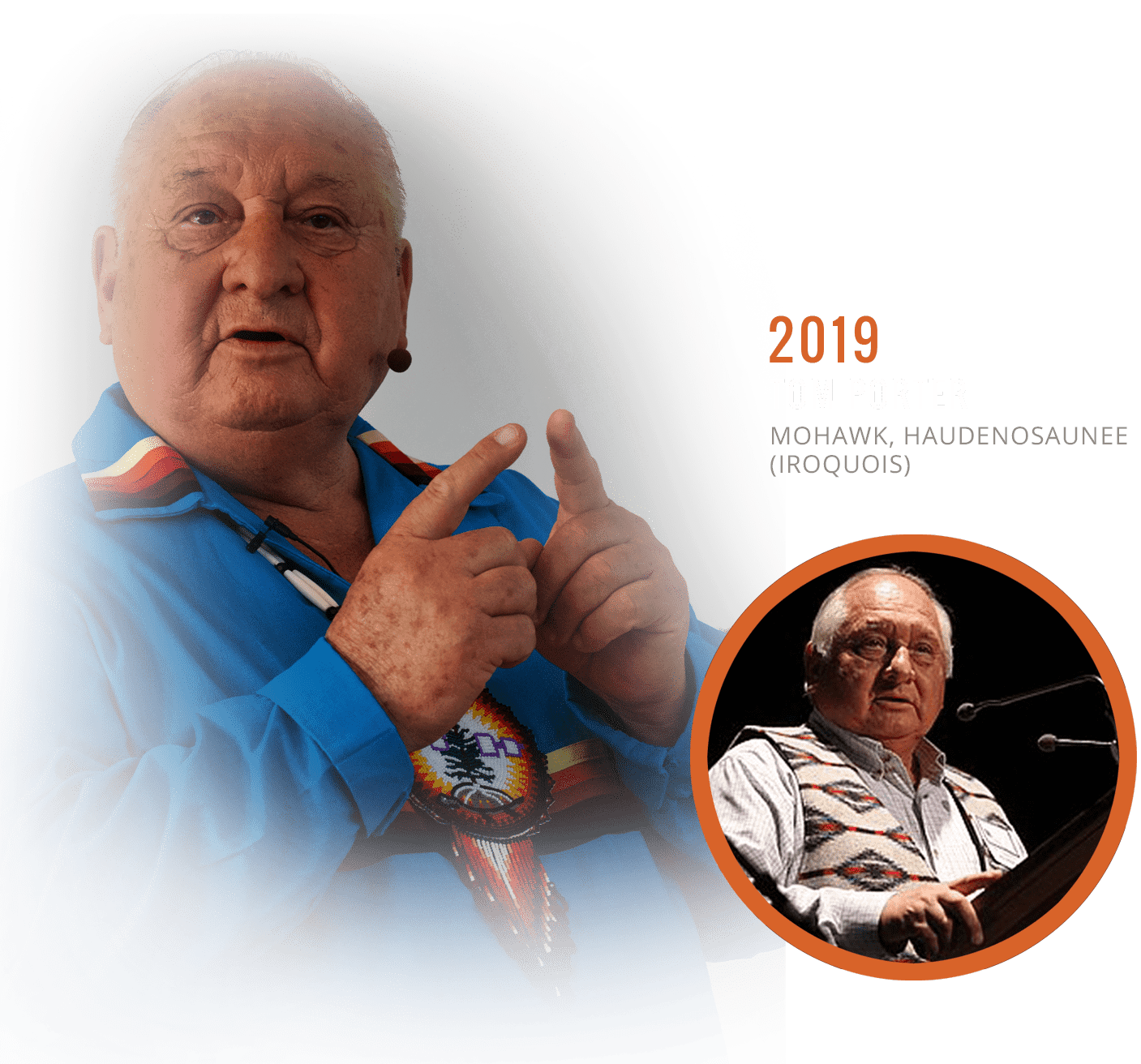
Thomas R. Porter (Sakokwenionkwas, meaning “The One Who Wins”) is the spokesperson and spiritual leader of the Mohawk Community of Kanatsiohareke (Ga na jo ha lay gay) in the Mohawk Valley near Fonda, New York, which he founded in 1993. He is a member of the Bear Clan of the Mohawk Nation at Akwesasne. Also known as the St. Regis Mohawk Reservation, Akwesasne straddles the New York State/Canadian border near Massena, New York. He is married to Alice Joe Porter, who is Choctaw. They have six children.
Mr. Porter was also the director of the Akwesasne Freedom School and a teacher at both the Akwesasne Freedom and the Kahnawake Survival Schools, where he taught Mohawk language, philosophy, history and carpentry. The purpose of both schools is to teach all of the usual subjects,, but within a traditional Mohawk worldview and with an emphasis on keeping the Mohawk language alive and vital. It is said that with the loss of language comes a loss of at least 50% of a people’s culture and identity.
Additionally, Mr. Porter worked as secretary for the Mohawk Nation Council of Chiefs for 8 years and as an interpreter for 11 years. He is still called on to help when his schedule allows.
He organized the “White Roots of Peace,” a traveling multi-media communications group designed to revitalize Native traditions and beliefs in North America, and was the group’s main speaker, lecturing at various universities and colleges across the United States and Canada.
For ten years, Mr. Porter was also the Native American consultant for the New York State Penitentiary System and Chaplain for all of the Native inmates in the New York State Penal System. His office was located in Albany, New York, but he traveled all over the state to meet and confer with Native inmates, as well as to teach and help them conduct traditional ceremonies.
In addition to everything else, Mr. Porter has authored various books and pamphlets, all of which teach about Mohawk traditions and spirituality. Most of these titles are available through the Craft Store at Kanatsiohareke:
Tsiniionkwarihotons
Clanology
O:nenhste (Corn)
Drum and Rattlemaking
Ohen:ton Karihwatehkwen (The Thanksgiving Address)
Mohawk Marriage
Traditional Mohawk Clothing
Akwesasne Mohawk Social Dances
Kanatsiohareke: Traditional Mohawk Indians Return to Their Ancestral Homeland
And Grandma Said…
Nobody Can Do It Better Than Warisosa
The recipient of numerous awards, Mr. Porter has been widely recognized and honored for his work.
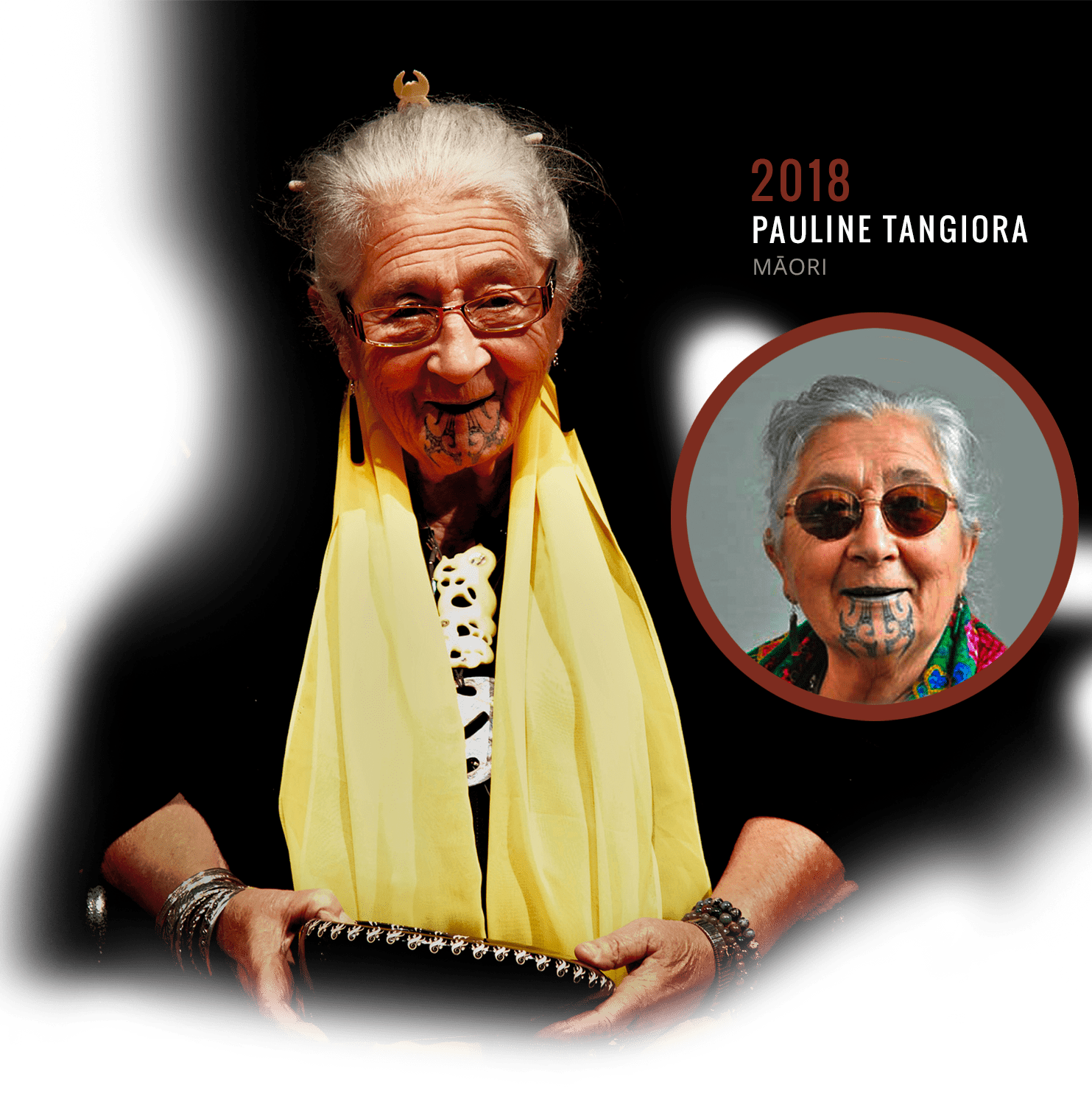
Pauline Tangiora is a Maori elder from the Rongomaiwahine Tribe on the North Island of Aotearoa (New Zealand). Deeply rooted in the ancestral wisdom of her Peoples she has devoted her life to environmental, peace and Indigenous rights work, both at home and around the world.
Since she was a child, Pauline has felt called to stand up for others. During the Vietnam War, she became involved in the peace movement, “keeping my eyes and ears open, writing letters to MPs, annoying anybody involved.” From there, Pauline began to work in the prison system, volunteering with the Maori Women’s Welfare League, helping to get books to prisoners, and shedding light on the damage done to Maori children who have been in state care.
Pauline was also instrumental in the Maori language recovery movement in the 1980s, which worked towards immersing infants in te reo (language) and improving the manner in which te reo and New Zealand’s shared history was taught in schools
She has travelled throughout the world communicating the ancient wisdoms of Indigenous Peoples. Her international work includes helping the San people in the African Kalahari preserve traditional places and cultural heritage; campaigning alongside environmentalists in Brazil for the protection of water; standing with Indigenous people in Mexico, as well as in solidarity with those at Standing Rock, USA; helping the Australian Aborigines revive a lost ritual with whales; and travelling with a peace caravan through North America in order to draw attention to the plight of Indigenous people in the South Pacific.
Among her numerous positions and affiliations, Pauline has been a Justice of the Peace, President of the Women’s International League for Peace and Freedom Aotearoa, Regional Women’s Representative for the World Council for Indigenous Peoples, Earth Charter Commissioner, Ambassador to the Earth Council International and to the 13 International Indigenous Grandmothers’ Council, a member of the World Future Council and the Maori Women’s Welfare League, and a Patroness of the Peace Foundation. She was also a consultant to the International Steering Committee of the World Court Project.
Pauline is known affectionately as Nanny Pauline or Aunty Pauline. She and her husband have a blended family: they have 14 children in total, 8 of them are theirs and 6 are her cousin’s. She has 52 grandchildren.
Her advice to all of her children: “Dream a dream, and you will get there, but it won’t come without hard work.”
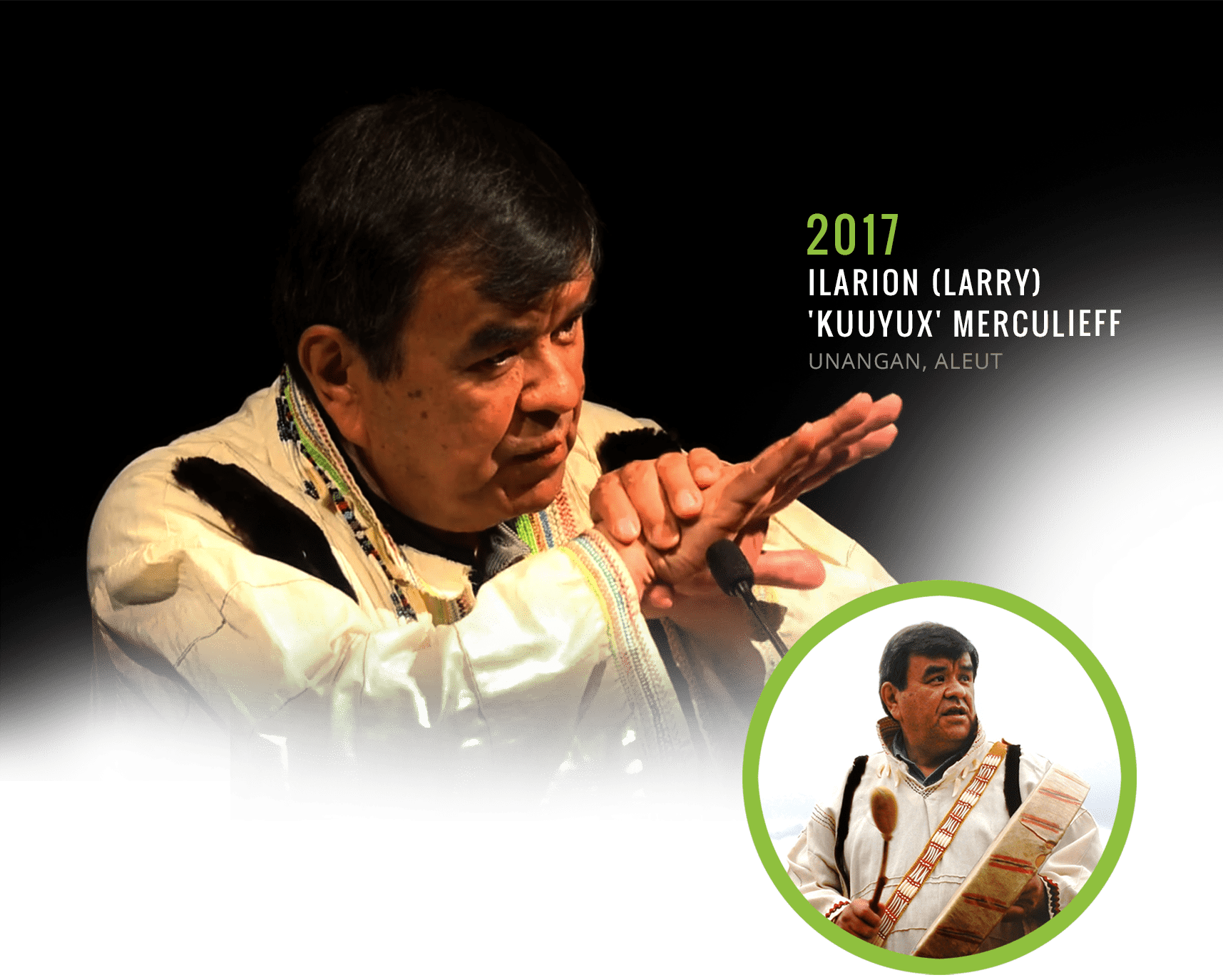
Larry “Kuuyux” Merculieff is of the last generation of Aleuts of the Alaskan Pribilof Islands to be fully raised in the traditional way. Kuuyux, a name given once a generation, means extension, like an arm extending from a body. Living this destiny, Larry served 35 years as a community leader on St. Paul Island, his home. His work now extends internationally, as he facilitates the use of traditional ways of dialogue, decision-making and consensus building, and talks about Indigenous elder wisdom for modern times. Larry helped secure recognition of Alaska Native subsistence fishing rights, and to develop culturally- based adaptation strategies for the impact of climate change. He has co-founded several organizations and received several awards for his work.
Larry Merculieff is an Indigenous messenger and teacher. Indigenous wisdom keepers throughout the western hemisphere and other parts of the world have shared their wisdom, knowledge and prophecies with him, asking him to share their words with others. Issues related to cultural and community wellness, traditional ways of living, elder wisdom, and the environment are close to his heart. He recently chaired the Indigenous knowledge sessions at the Global Summit of Indigenous Peoples on Climate Change attended by Indigenous representatives from 80 nations.
Larry Merculieff has served his people, the Unangan (Aleuts) of the Pribilof Islands and Indigenous peoples worldwide, for four decades. His writings and interviews have appeared in such publications as the Winds of Change, YES, Red Ink, Alaska Geographic, Smithsonian, National Geographic, and Kindred Spirits. Larry was featured in National Wildlife magazine as an “American Hero”, having called national and international attention to major adverse changes in the Bering Sea ecosystem. His life story was featured as one of ten Native American men in the United States who were selected for a book titled “Native American Men of Courage”, published by Second Story Press. Wisdomkeeper, One Man’s Journey to Honor the Untold Story of the Unangan People, is about the wisdom of Elders through the lens of his life, with North Atlantic Books in July of 2016.
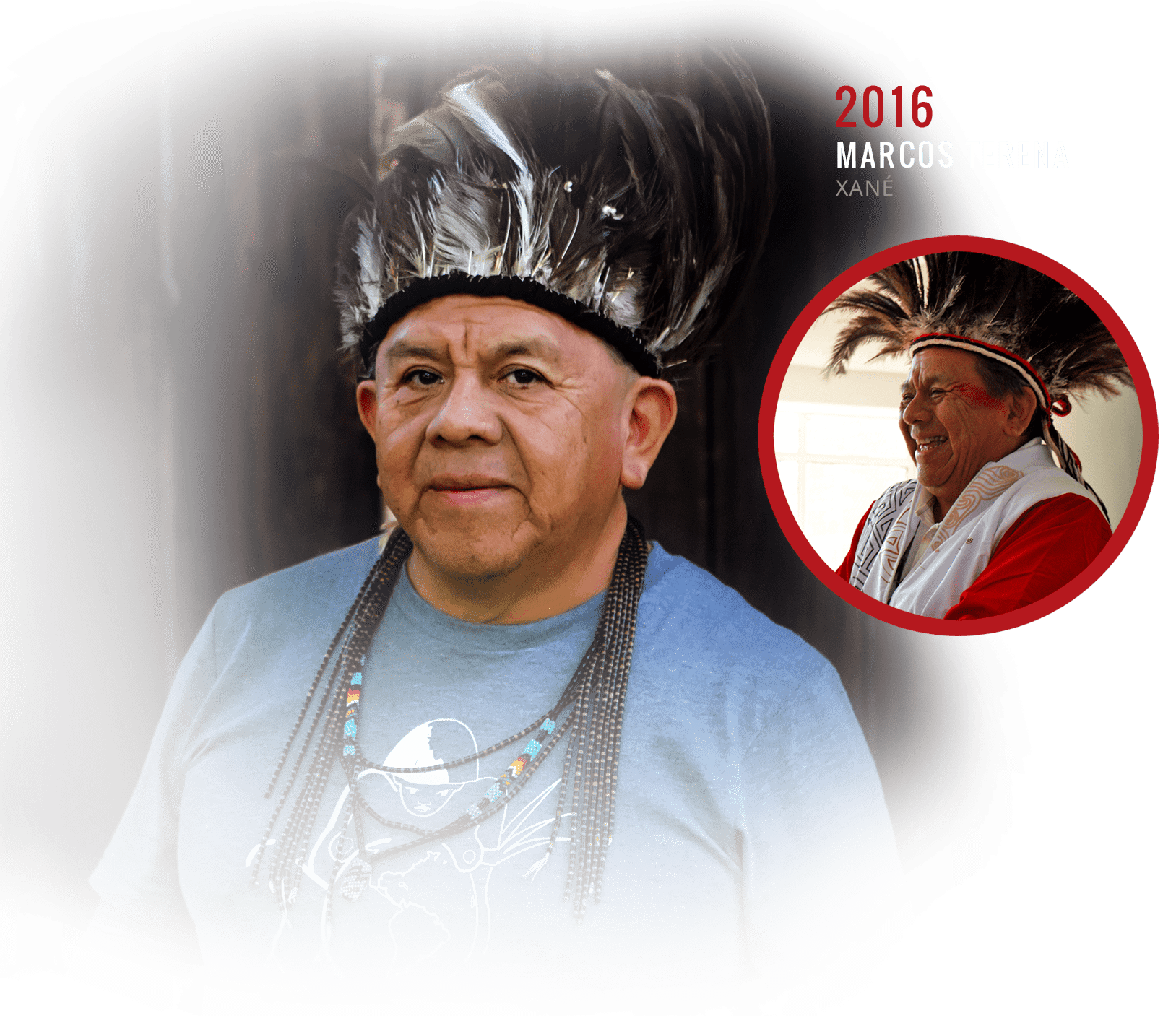
Mariano Marcos Terena, is the son of the Xané Pueblo, from the region of Aguas del Pantanal, between Brazil, Bolivia and Paraguay. A Brazilian national born in 1954 he is a Xané leader who has devoted his life to working and organizing for the rights of Indigenous people and for the earth itself. In 1977, Marcos founded the first Indigenous political movement in Brazil, the Union of Indigenous Nations. In 1992 he organized a landmark event in the struggle for Indigenous peoples’ rights, the World Conference of Indigenous Peoples on Territories, Environment and Development. At this historic gathering, Marcos was chosen by over 700 Indigenous leaders from around the world to deliver their message to world leaders at the United Nations Earth Summit (UNCED). Marcos is also a founding member of the Inter-Tribal Committee, Land is Life, the International Alliance of Indigenous-Tribal Peoples of the Tropical Forests, the Brazilian Indigenous Institute for Intellectual Property, the World Indigenous Games Festival, and the Call of the Earth Circle.
He founded the Union of Indigenous Nations (UNIND), and was involved in the process to include Indigenous peoples rights in the Brazilian constitution. Marcos has advised Ministers and official sectors of Brazil on Indigenous people matters. The relevance of his work is well known in International forums such as the United Nations, the Organization of American States, and the World Intellectual Property Organization where he has acted as adviser and spokesman on behalf on Indigenous people movements. Among others, Marcos was involved in the following initiatives: the creation of the UN Permanent Forum on Indigenous Issues, coordination of the Forum for the Protection of Traditional Knowledge in Brazil and jointly with the World Intellectual Property Organization (WIPO) and he also coordinated the Indigenous people panel in Santiago +5 Conference on Racial Equality.
Besides being the creator of Indian Voice, a radio program, Marcos Terena has also commented about Indigenous rights in various television programs. He has written two books: The Indian Aviator and The Citizens of the Jungle.
“We came here to fight for life. We came here to fight for our life, for our survival, but also for the survival of the planet, and the planet is just like a big canoe, a big boat, where we have blacks, Indians, whites. Because, when your lungs fail, can no longer breathe this air, your bodies will be sick and so will ours. And when we no longer have any water to drink, when you can no longer quench your thirst with the water from rivers, when you can no longer have forests, what are you going to do? You may invent some kind of pill to quench your thirst, but this will never taste as good as the fresh waters that we drink in our forests.” – Marcos Terena (1992)
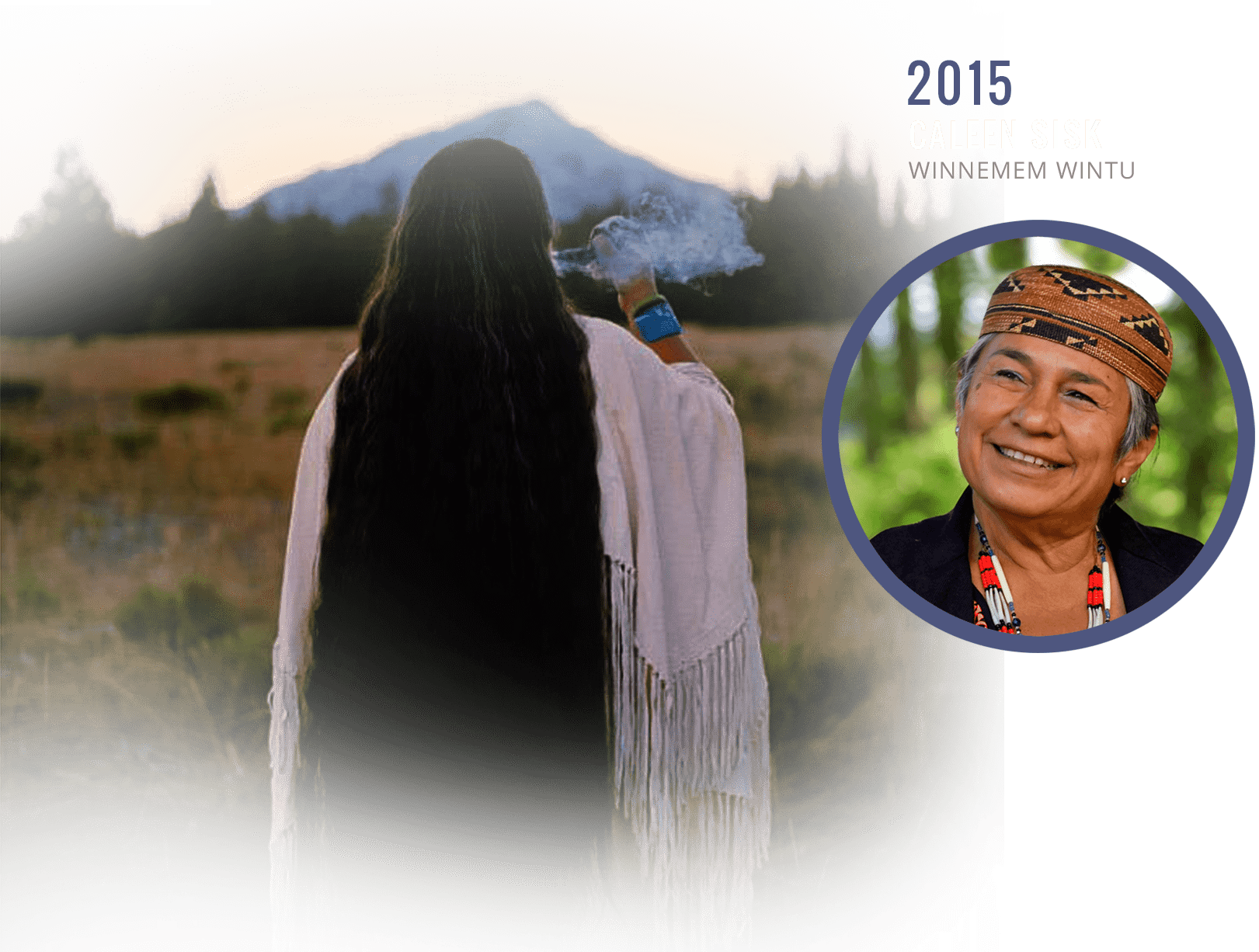
Caleen Sisk is the Spiritual Leader and Tribal Chief of the Winnemem Wintu Tribe, who practice their traditional culture and ceremonies in their territory along the McCloud River watershed in Northern California. For more than 30 years, Caleen was mentored and taught in traditional healing and Winnemem culture by her late great aunt, Florence Jones, who was the tribe’s spiritual leader for 68 years. Caleen’s traditional teachings and training comes from an unbroken line of leadership of the Winnemem Wintu Tribe. Since assuming leadership responsibilities in 2000, Caleen has focused on maintaining the cultural and religious traditions of the Tribe as well as advocating for California salmon restoration, the Human Right to Water and the protection of Indigenous sacred sites. She is also currently leading her Tribe’s efforts to work with Maori and federal fish biologists to return Chinook salmon to the McCloud River.
Caleen is an internationally known speaker on traditional tribal and spiritual issues, having spoken on diverse topics such as spiritual medicine ways, the spirit of water, global warming, sacred sites protection and the responsibility of tribal people to honor their tribal lifeway.
Caleen is also a leading voice in raising awareness of the poor human rights conditions suffered by federally unrecognized tribes and unrepresented Indigenous peoples around the world. She is a regular speaker at the United Nations Permanent Forum on Indigenous Issues in New York where she has campaigned for the U.N. to study the plight of federally unrecognized tribes in the United States. She is also the Spiritual and Environmental Commissioner for ENLACE Continental, an international network of Indigenous women.
Strongly rooted in her spirituality and her family, Caleen cares deeply for her Winnemem people and for oppressed people around the world. Caleen received her B.A. from Chico State University, CA in 1975, and received her teaching credential from CSU, Chico in 1976.
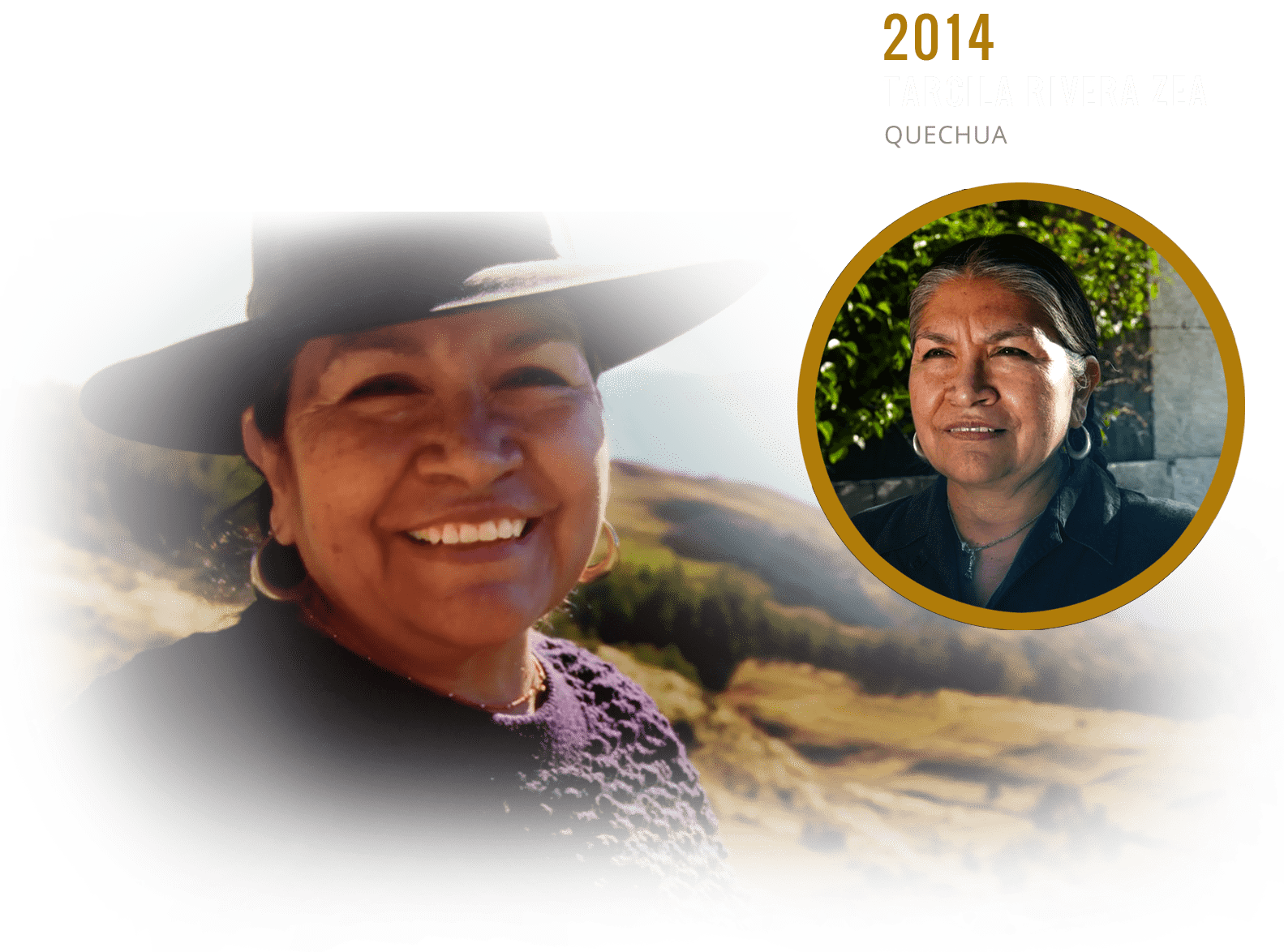
Tarcila Rivera Zea is a Quechuan activist from Ayacucho, Peru who has devoted over 20 years of her life to defend and seek recognition and acknowledgment of Peruvian Indigenous peoples and cultures.
Tarcila moved to Lima when she was ten years old, and worked as a domestic worker in exchange for education, learning Spanish only at age 18. She finished high school at age 21. She then went to work at the National Institute of Culture (INC) in 1972 as a secretary. While there, she won a series of OAS scholarships to specialize in archival and library studies in Argentina and at the Vatican.
In the 1980s, Tarcila joined the Indian Council of South America as a journalist, contributing to the magazine Indian People. She collected testimonies of Indigenous women raped in prison during the political violence. For this work, Tarcila was recognized by a foundation in Holland, who invited her to pursue a human rights degree at the Institute of Social Studies (ISS) in The Hague.
Tarcila founded Chirpaq (Center for Indigenous Peoples’ Cultures of Peru) in 1986 as an association committed to the recognition and full exercise of the rights of Indigenous peoples, giving priority to the leadership of women and Indigenous youth. She has led Chirapaq to become a leading agency for the rights of Indigenous women and is currently the Executive Director of Chirapaq, in Peru
Since 1987, Tarcila has participated in the Working Group of Indigenous Peoples in the formation of the Permanent Forum on Indigenous Issues at the United Nations (UN) and the UN Declaration on the Rights of Indigenous Peoples. She also participated in the International Conference on Population and Development in Cairo (Egypt, 1994), the World Conference on Women (Beijing, 1995) and the Declaration and Program of Action of Durban (adopted at the World Conference Against Racism, Racial Discrimination, Xenophobia and Related Intolerance, South Africa, 2004). She provided input into policies concerning intercultural education, empowerment and the visibility of Indigenous women.
In the past 20 years, Tarcila has contributed to the creation of the Continental Network of Indigenous Women of the Americas (ECMI), the International Indigenous Women Forum (FIMI) and the International Indigenous Press Agency (AIPIN). Her contributions have resulted in the creation of the Permanent Workshop of Andean and Amazonian Indigenous Women of Peru, the International Forum of Indigenous Women of the Americas and the Continental Link of Indigenous Women of the Americas.
Tarcila is also a member of:
- Consultative Committee of the Peruvian Committee of Women Parliamentarians;
- Indigenous Initiative for Peace led by Rigoberta Menchú (Nobel Peace Prize Laureate);
- Commission on Intellectual Property Commercialization of the Continental Indigenous Women’s Movement;
- Monitoring Committee of the Pact of Pedregal; and
- Association for Women’s Rights in Development (AWID) (board member)
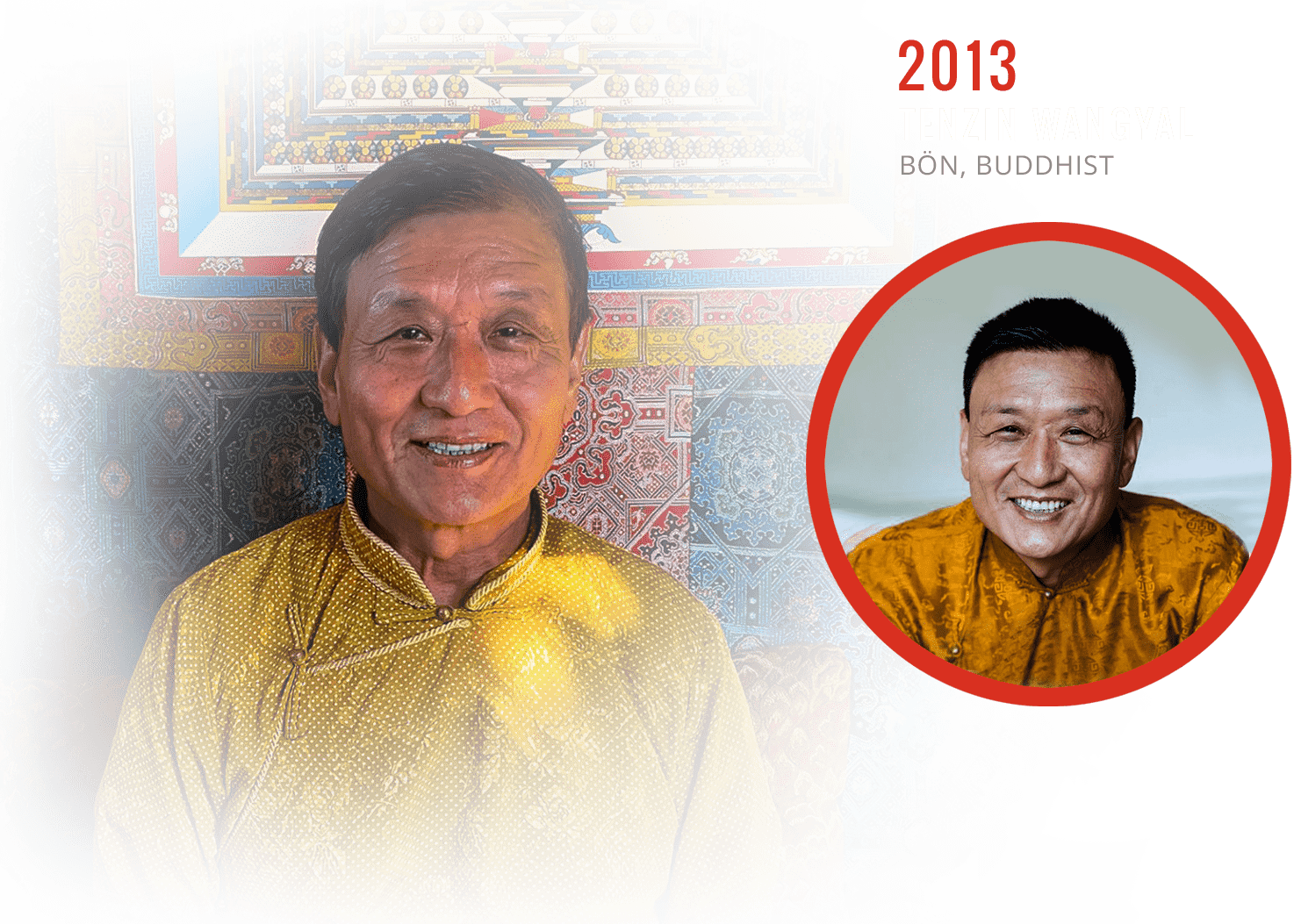
Tenzin Rinpoche was born in Amritsar, India, not long after his parents escaped their Tibetan homeland in 1959 during the Chinese Cultural Revolution. At age 10 Tenzin Rinpoche was ordained as a monk at Menri Monastery near Dolanji, India. There he was recognized by head teacher Lopon Sangye Tenzin Rinpoche as a reincarnation of the famous master Khyung Tul Rinpoche, a renowned meditation master, teacher, scholar and healer who died in the mid-20th century.
From the age of 13 Rinpoche practiced dzogchen under the guidance of masters from both the Bon and Buddhist schools of Tibet, including (from Bon) His Holiness Lungtok Tenpai Nyima, Lopon Sangye Tenzin Rinpoche, Lopon Tenzin Namdak Rinpoche, and Geshe Yungdrung Namgyal. From his early adolescence until young adulthood, Tenzin Rinpoche was raised like a son by his root teacher Lopon Tenzin Namdak Rinpoche, today revered as the most senior teacher of the Bon tradition. An accomplished scholar in the Bon Buddhist textual traditions of philosophy, exegesis and debate, Tenzin Wangyal Rinpoche in 1986 completed an 11-year course of traditional studies at the Bon Dialectic School of Menri Monastery, where he received his geshe degree, equivalent to a doctorate in philosophy from Western universities.
Upon graduating, Tenzin Rinpoche was employed at the Library of Tibetan Works and Archives at Dharamsala, India. That same year His Holiness the XIV Dalai Lama appointed Rinpoche to be the Bon tradition’s representative to the Assembly of Tibetan People’s Deputies of the Tibetan-Government-in-Exile.
Tenzin Wangyal Rinpoche was one of the first to bring the precious Bon teachings to the West. In 1991 Tenzin Rinpoche was awarded a Rockefeller Fellowship at Rice University in Houston, Texas, where he continued his research into early Bon tantric deities and their relationship to Buddhist traditions in early Buddhist Tibet. He was awarded a second Rockefeller Fellowship in 1993 when Rice University invited him back to teach during the spring semester. In 1998 Rinpoche established the Serenity Ridge Retreat Center.
Since that time Tenzin Rinpoche has chosen to remain in the West to teach the ancient Bon traditions to Western students. In March 1992 Rinpoche founded Ligmincha Institute in Charlottesville, Va., a nonprofit organization whose purpose is to preserve for future generations the ancient teachings, arts, sciences, language and literature of Tibet and Zhang Zhung.
In 1994 he received a grant from the National Endowment for the Humanities. Today Rinpoche continues his dedicated efforts to preserve the Bon Buddhist tradition through establishing centers and groups worldwide, through translating and publishing texts, and through teaching Bon as an authentic, living tradition to Western students around the world.
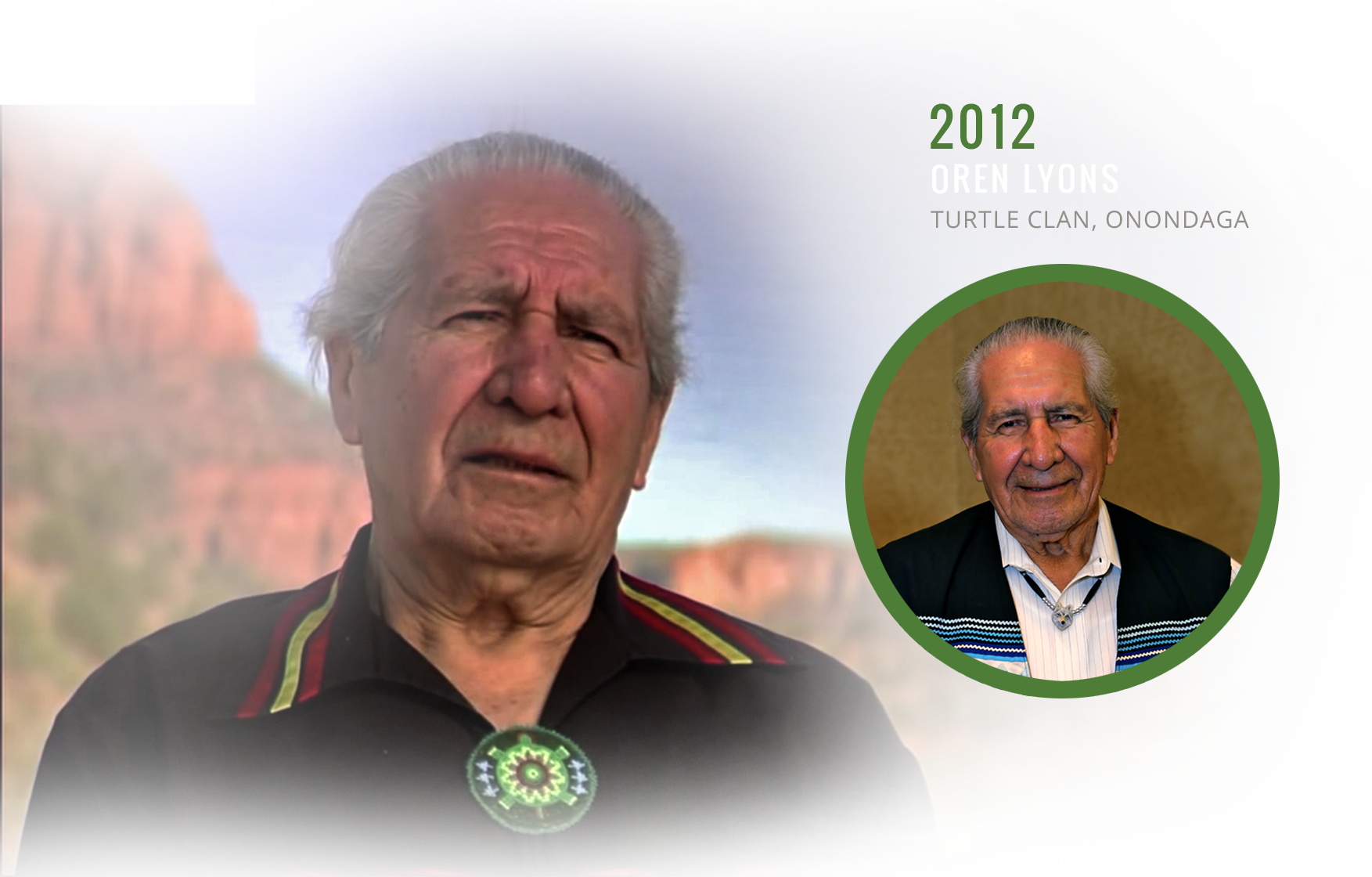
Oren Lyons is a traditional faithkeeper of the Turtle Clan of the Onondaga Nation who sits on the Onondaga Council of Chiefs. Born in 1930, he was raised in the traditional life ways of the Haudenosaunee on the Seneca and Onondaga reservations. As a youth he left for New York City but in 1970, Lyons returned to his ancestral homeland in upstate New York to act as Faithkeeper of the Turtle Clan. In this capacity, he is entrusted with keeping alive his people’s traditions, values and history. Since then he has dedicated his life to preserving and protecting Indigenous lifeways by being one of the key players in establishing the Working Group on Indigenous Peoples at the United Nations. He is deeply involved with national and international issues that affect native peoples and has represented them in many forums throughout the world, focusing on the rights and status of Indigenous peoples, the environment and sustainable development.
In 1977 he help create the Traditional Circle of Indian Elders and Youth. Since then with the financial and administrative support of the American Indian Institute, the Traditional Circle has gathered each year at a different site in Indian country. He has traveled the world and given many lectures where he has spoken about the importance of the Indigenous perspective and way of life, creating awareness on his People’s ways.
Among his accolades he has received the Ellis Island Congressional Medal of Honor, the National Audubon Award, the First Annual Earth Day International Award of the United Nations, the Elder and Wiser Award of the Rosa Parks Institute for Human Rights, as well as the Wisdom Fellowship Award of the Sacred Fire Foundation. He serves on the Executive Committee of the Global Forum of Spiritual and Parliamentary Leaders on Human Survival, and is a principal figure in the Traditional Circle of Indian Elders.



